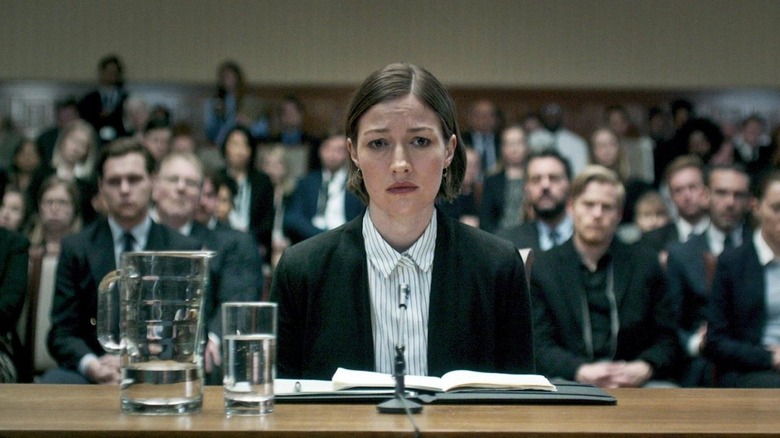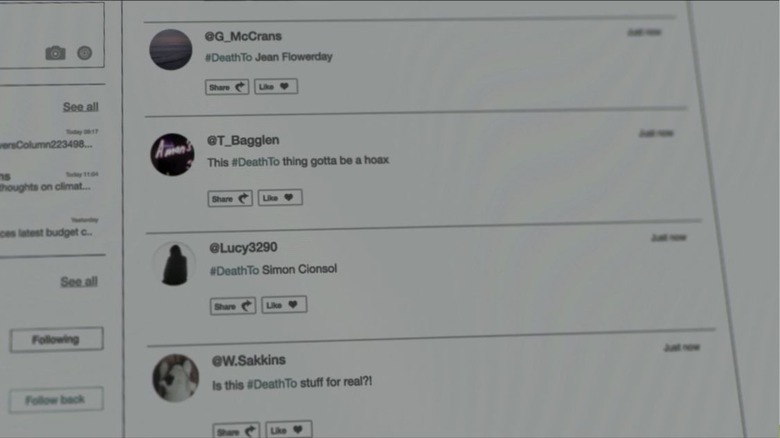Black Mirror's Hated In The Nation Was True-To-Life For Creator Charlie Booker
"Black Mirror" has never been particularly subtle about the points it's making with each episode, and the final season 3 story "Hated in the Nation" might be the most to the point. It's all about a viral hashtag where Twitter users get to wish death upon whoever they want, and the person who's named in the hashtag the most each day gets murdered by a bunch of robot bees.
While the whole bee thing might seem silly, the idea that swarms of people would gleefully take part in the hashtag — even after it became clear that there were real consequences — is painfully realistic. The internet has given people the freedom to be a lot bolder with their words than they'd probably be in face-to-face interactions, and it's also made it so that a person can be subjected to a nearly-unfathomable number of hate messages all at once.
For Charlie Brooker, the premise came from a personal place. The bold, foul-mouthed writer has himself been on the wrong end of a barrage of hate messages, although luckily this happened to him back in the pre-Twitter days. In 2004, he wrote a satirical article in The Guardian criticizing George W. Bush, where he wrote: "Lee Harvey Oswald, John Hinckley Jr – where are you now that we need you?"
The American political landscape of 2004 was not particularly forgiving of this sort of joke. The Guardian was forced to remove the article and issue an apology, while Brooker was the recipient of tons of hate mail and death threats. "Someone wrote to say that they were going to smuggle a sniper rifle through customs and kill me, so I had better walk close to buildings, stay under trees and move in a zig-zag," Brooker explained. "Does that count as reader feedback?"
A somewhat cathartic episode
Explaining the connections between his experience and the episode, Brooker told BBC: "My own incident pre-dated Twitter, and my vilification was done by good old-fashioned email, but some of the characters in 'Hated in the Nation' say things that I was experiencing at the time." He also did some research on what it's like for people to deal with this sort of thing in the Twitter age: "I also read a book for research that deals with people caught up in Twitter storms. The author hangs out with them and sees how devastated they are, often by the sheer volume of comments they receive."
It's what makes "Hated in the Nation" feel so cathartic to anyone who's ever been dogpiled on the internet. The episode's a keenly-observed breakdown of how people feel comfortable saying terrible things to strangers in a public forum; it juxtaposes the horrific deaths of the internet's victims with the callous, self-righteous tweets behind the #DeathTo movement. It results in an episode that should make anyone who's participated in a Twitter pile-on pause and wonder, at least for a moment, if they'd really been doing the right thing.
Then, in what could easily be seen as poetic justice, the tables turn. It turns out that the guy engineering the murders was only doing it as a trap. His real targets were all the people who like to take part in these Twitter storms, and they're all murdered by the bees at once. The death toll is in the hundreds of thousands. But despite Brooker's legitimate beef with people who do this stuff, the conclusion to "Hated in the Nation" is clearly not supposed to be a happy one.
No winners here
Perhaps the most disturbing part of this episode is the innocent casualties. One character used the hashtag not out of any malicious intent, but to try to get the attention of the suspect they were hunting down. Then there are the people who used the tag simply to ask questions about it, the people who used it early on before it became clear what the consequences were, or those who were making a joke.
Even for the people who knowingly participated, their punishment is still painted as disproportionately harsh, and it wasn't something the hacker had any authority to dole out. "Black Mirror" has never been a big fan of vigilantism, and "Hated in the Nation" is no exception. The episode ends with Blue Coulson (Faye Marsay) zeroing in on the guy months later to hopefully arrest him.
This could've been a standard morality tale with the simple message of "don't be a jerk to people online," but it's the fact that the episode has empathy for the mob that makes it stand out. (It's what makes it good enough for us to rank it as the fifth-best episode of the show.) If anything, the real villain here is not the bees or the mean tweeters, but the algorithm (and the lack of regulation) that lets things so easily get out of hand. As Brooker once explained: "I think, by and large, the internet is a force for good. There may be a lot of toxicity online, but I think eventually humans will work out a code of conduct without the need for legislation."
Until that happens, however, we should try our best to move past our desire for vengeance against strangers on the internet. Even without the robot bees, it's not worth the trouble.


